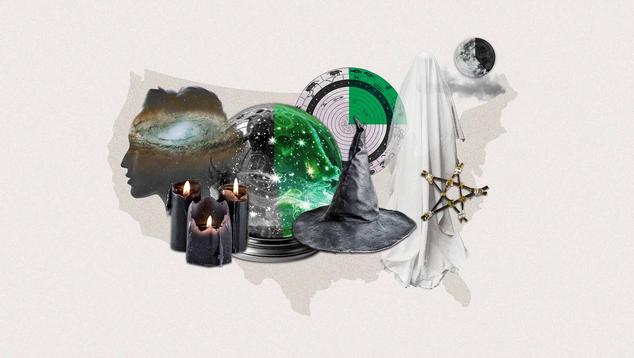WASHINGTON, D.C. — Americans are broadly skeptical about each of eight paranormal phenomena tested in a recent Gallup poll. Nearly half of U.S. adults, 48%, believe in psychic or spiritual healing. Slightly fewer, 39%, express a belief in ghosts, while between 24% and 29% say they believe in six other supernatural phenomena, including telepathy, communication with the dead, clairvoyance, astrology, reincarnation and witches.
For each of these paranormal phenomena, respondents were asked whether or not they believe in it or are unsure. Roughly one in five Americans are unsure about each of them, while at least half say they don’t believe in clairvoyance (50%), reincarnation (50%), astrology (55%) or witches (60%).
These findings are based on a Gallup poll conducted May 1-18, 2025.
Americans’ levels of belief in five of the eight paranormal phenomena are statistically similar to Gallup’s 2001 readings. Gallup has previously asked about various paranormal phenomena in 1990, 1991, 1994, 1996, 2001 and 2005 surveys. Comparisons to some of these past data are complicated by whether the paranormal questions were preceded by questions about religion, which appear to influence the way people think about communicating with the dead and ghosts or spirits.
The 1994, 2001 and 2025 surveys included religion questions. A comparison of the 2025 results with those from 2001 shows that Americans’ beliefs in paranormal phenomena are largely unchanged. The exceptions are six-percentage-point declines in belief in psychic or spiritual healing and clairvoyance, and a seven-point drop in belief in telepathy.
One in Three Americans Generally Open to Paranormal Ideas
Gallup conducted a cluster analysis on the 2025 data to assess whether the same individuals tend to believe in multiple paranormal concepts or whether different groups believe in different ones. The results suggest that it is more often the same people believing in multiple phenomena that make up the bulk of believers in the U.S. The analysis identifies two distinct groups: 34% of Americans who are generally open to paranormal concepts and believe in at least three and an average of five of them; and the remaining 66% of U.S. adults who are generally skeptical — on average, believing in just one.
Among skeptics, belief in psychic or spiritual healing (33%) stands out as an exception to their otherwise closed attitude towards paranormal phenomena. Ten percent of Americans, about half of those possessing only one paranormal belief, endorse psychic or spiritual healing and nothing else. By contrast, those more open to belief endorse most of the concepts tested, with the highest agreement for ghosts (89%) and the lowest for witches (45%).
Women (40%), political moderates (37%) and liberals (35%), people who infrequently attend religious services (40%) and college nongraduates (38%) are more likely to be open to belief than men (28%), conservatives (28%), weekly churchgoers (22%) and college graduates (28%). There are not meaningful differences by age, religious affiliation or political party identification.
In contrast, paranormal skeptics are most likely found among those who attend religious services weekly or almost weekly (78%). As service attendance declines, so does paranormal skepticism, as those who attend once a month are slightly more likely to be skeptics (64%) than those who never attend (57%).
Bottom Line
Most Americans approach paranormal phenomena with caution; however, women, those who attend church less frequently and adults without a college degree are more likely than their counterparts to be open to believing in at least a few paranormal phenomena. Meanwhile, religious service attendance is most associated with skepticism. Despite a decline in church attendance over the past two decades, belief in the paranormal has not increased. Overall, no single phenomenon receives endorsement from a majority of Americans, and two-thirds remain generally unconvinced of paranormal ideas.
Stay up to date with the latest insights by following @Gallup on X and on Instagram.
Learn more about how the Gallup Poll Social Series works.
View complete question responses and trends (PDF download).




